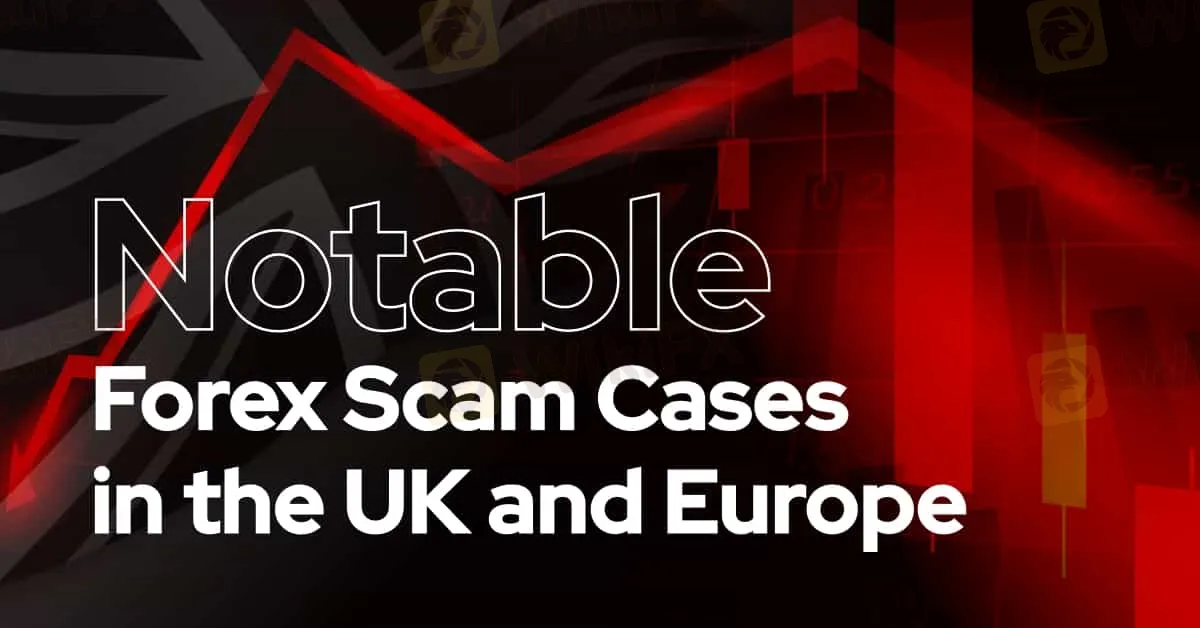简体中文
繁體中文
English
Pусский
日本語
ภาษาไทย
Tiếng Việt
Bahasa Indonesia
Español
हिन्दी
Filippiiniläinen
Français
Deutsch
Português
Türkçe
한국어
العربية
Unmasking Deceit: Notable Forex Scam Cases in the UK and Europe
Abstract:This article takes a closer look at notable cases of forex scams in the region, unraveling the tactics used and the consequences faced by unsuspecting investors.

In the ever-evolving realm of forex trading, stories of financial deception and shattered dreams have become all too familiar. The United Kingdom and Europe, known for their robust financial sectors, have not been immune to the rise of forex scams. This article takes a closer look at notable cases of forex scams in the region, unraveling the tactics used and the consequences faced by unsuspecting investors.
The Real Faces of Fraud: Notable Forex Scam Cases
Forex scams are not merely abstract threats; they manifest in the lives of individuals who have fallen prey to deceptive practices. One such case involves a fraudulent investment scheme that promised unprecedented returns, attracting investors from various corners of Europe. When the scheme eventually collapsed, it left a trail of financial ruin for those who had placed their trust in the enticing promises of profitability.
Examining the Tactics: Lessons from Real Cases
By dissecting specific cases, we gain insight into the tactics employed by scammers. In the aforementioned case, the perpetrators utilized sophisticated marketing strategies, creating an illusion of credibility through professional-looking websites and persuasive communication. Traders were enticed by promises of guaranteed profits, only to find themselves facing substantial losses when the scheme crumbled.
Regulatory Responses: The Importance of Swift Action
Notable forex scam cases often serve as catalysts for regulatory bodies to intensify their efforts. The Financial Conduct Authority (FCA) and the European Securities and Markets Authority (ESMA) play pivotal roles in investigating and taking action against fraudulent entities. These responses not only aim to hold wrongdoers accountable but also serve as a deterrent to others contemplating similar schemes.
Learning from Mistakes: Investor Education
Investor education is a crucial component of the fight against forex scams. By highlighting real cases, regulators and educational platforms can illustrate the potential risks and consequences of fraudulent activities. Traders are encouraged to exercise due diligence, conduct thorough research, and stay informed to avoid falling victim to scams.
WikiFX: Your Shield Against Scams
In the quest for a safer trading environment, WikiFX emerges as a valuable ally for traders. By offering a comprehensive database of brokers, WikiFX provides essential information about their regulatory status, user reviews, and any reported scams or fraudulent activities. Traders can leverage this knowledge to make informed decisions and protect themselves from potential pitfalls.
Are you concerned about the legitimacy of your forex broker? Visit www.wikifx.com to access WikiFX and equip yourself with the tools needed to navigate the complex world of forex trading.
Conclusion: Empowering Traders Through Awareness
Notable forex scam cases serve as cautionary tales, emphasizing the importance of vigilance and due diligence in the forex market. By learning from the experiences of others, traders can actively contribute to a safer trading environment. With the support of regulatory bodies and educational platforms like WikiFX, investors can navigate the complexities of forex trading with confidence, minimizing the risks associated with deceptive practices.

Disclaimer:
The views in this article only represent the author's personal views, and do not constitute investment advice on this platform. This platform does not guarantee the accuracy, completeness and timeliness of the information in the article, and will not be liable for any loss caused by the use of or reliance on the information in the article.
Read more

Using Any of These Illegal Forex Trading Apps? Stop Before It Turns into a Crisis
The Reserve Bank of India (RBI) has listed out some illegal forex apps India. Read this article to know some of those apps.

5 Reasons to Stay Away from Core Prime Markets
The Forex market is a very unpredictable, complex, and risky place. There are many brokers that appear genuine but can steal your hard-earned money. So, staying alert is the only way to survive in this dynamic environment. Therefore, in this article, we are sharing 5 warning signs about Core Prime Markets.

Think Before You Trade! Unlicensed Brokers List Inside
The French regulator AMF has issued a warning against five unlicensed brokers. Investors are encouraged to verify the list to protect themselves from fraud.

Citibank Sued in $20M Romance Scam Tied to Fraudulent Transfers
Citibank faces a lawsuit over a $20M romance scam. Plaintiff alleges the bank enabled fraud by failing to block suspicious transfers.
WikiFX Broker
Latest News
The Shame of Being Scammed: Don't Ever Stay Silent
Citibank Sued in $20M Romance Scam Tied to Fraudulent Transfers
Treasury yields inch higher as investors await the Fed's preferred inflation print
Capital.com Launches $1 Million EU Client Insurance to Enhance Investor Safety
The five most investment-risky brokers in Malaysia
Think Before You Trade! Unlicensed Brokers List Inside
IC Markets Sponsors AEL Limassol, Football Club Until 2027
5 Reasons to Stay Away from Core Prime Markets
Core inflation rate rose to 2.7% in May, more than expected, Feds preferred gauge shows
Core inflation rate rose to 2.7% in May, more than expected, Fed's preferred gauge shows
Currency Calculator


